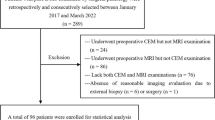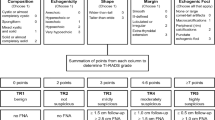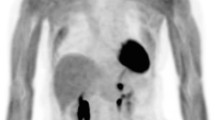Abstract
Mammography is the primary imaging modality for screening of breast cancer and evaluation of breast lesions (T staging). Ultrasonography is an adjunctive tool for mammographically suspicious lesions, in patients with mastopathy and as guidance for reliable histological diagnosis with percutaneous biopsy. Dynamic enhanced magnetic resonance mammography (MRM) has a high sensitivity for the detection of breast cancer, but also a high false positive diagnosis rate. In the literature, MRM is reported to have a sensitivity of 86–96%, a specificity of 64–91%, an accuracy of 79–93%, a positive predictive value (PPV) of 77–92% and a negative predictive value (NPV) of 75–94%. In unclarified cases, metabolic imaging using fluorine-18 fluorodeoxyglucose positron emission tomography (FDG PET) can be performed. In the literature, FDG PET is reported to have a sensitivity of 64–96%, a specificity of 73–100%, an accuracy of 70–97%, a PPV of 81–100% and an NPV of 52–89%. Furthermore, PET or PET/CT using FDG has an important role in the assessment of N and M staging of breast cancer, the prediction of tumour response in patients with locally advanced breast cancer receiving neoadjuvant chemotherapy, and the differentiation of scar and cancer recurrence. Other functional radionuclide-based diagnostic tools, such as scintimammography with sestamibi, peptide scintigraphy or immunoscintigraphy, have a lower accuracy than FDG PET and, therefore, are appropriate only for exceptional indications.



Similar content being viewed by others
References
Parker S, Tong T, Bolden S, Wingo PA. Cancer statistics. CA Cancer J Clin 1997; 47:5–27.
Fournier D von, Anton H, Junkermann H, Bastert G, van Kaick G. Brustkrebsscreening. Radiologe 1993; 33:227.
Wald N, Chamberlain J, Hackshaw A. Consensus conference on breast cancer screening. Oncology 1994; 51:380–389.
Ariga R, Bloom K, Reddy V, Kluskens L, Francescatti D, Dowlat K, Siziopikou P, Gattuso P. Fine-needle aspiration of clinically suspicious palpable breast masses with histopathologic correlation. Am J Surg 2002; 184:410–413.
Tardivon AA, Guinebretiere JM, Dromain C, Vanel D. Imaging and management of nonpalpable lesions of the breast. Eur J Radiol 2002; 42:2–9.
Liu CS, Shen YY, Lin CC, Yen RF, Kao CH. Clinical impact of [18F]FDG-PET in patients with suspected recurrent breast cancer based on asymptomatically elevated tumor marker serum levels: a preliminary report. Jpn J Clin Oncol 2002; 32:244–247.
Stavros AT, Thickmann D, Rapp CL, Dennis MA, Parker SH, Sisney GA. Solid breast nodules: use of sonography to distinguish between benign and malignant lesions. Radiology 1995; 196:123–134.
Bombardieri E, Crippa F. PET imaging in breast cancer. Q J Nucl Med 2001; 45:245–256.
Buck A, Schirrmeister H, Kühn T, Shen C, Kalker T, Kotzerke J, Dankerl A, Glatting G, Reske S, Mattfeldt T. FDG uptake in breast cancer: correlation with biological and clinical prognostic parameters. Eur J Nucl Med Mol Imaging 2002; 29:1317–1323.
Szabo BK, Aspelin P, Wiberg MK, Bone B. Dynamic MR imaging of the breast. Analysis of kinetic and morphologic diagnostic criteria. Acta Radiol 2003; 44:379–386.
Fischer DR, Baltzer P, Malich A, Wurdinger S, Freesmeyer MG, Marx C, Kaiser WA. Is the “blooming sign” a promising additional tool to determine malignancy in MR mammography? Eur Radiol 2004; 14:394–401.
Crippa F, Seregni E, Agresti R, Chiesa C, Pascali C, Bogni A, Decise D, de Sanctis V, Greco M, Daidone MG, Bombardieri E. Association between [18F]fluorodeoxyglucose uptake and postoperative histopathology, hormone receptor status, thymidine labelling index and p53 in primary breast cancer: a preliminary observation. Eur J Nucl Med 1998; 25:1429–1434.
Scheidhauer K, Scharl A, Pietrzyk U, Wagner R, Göhring U-J, Schomäcker K, Schicha H. Qualitative [18F]FDG positron emission tomography in primary breast cancer: clinical relevance and practicability. Eur J Nucl Med 1995; 36:1882–1884.
Pietrzyk U, Scheidhauer K, Scharl A, Schuster A, Schicha H. Presurgical visualization of primary breast carcinoma with PET emission and transmission imaging. J Nucl Med 1995; 36:1882–1884.
Avril N, Menzel M, Dose J, Schelling M, Weber W, Jänicke F, Nathrath W, Schwaiger M. Glucose metabolism of breast cancer assessed by18F-FDG PET: histological and immunohistochemical tissue analysis. J Nucl Med 2001; 42:9–16.
Avril N, Bense S, Ziegler S, Dose J, Weber W, Laubenbach C, Romer W, Janicke F, Schwaiger M. Breast imaging with fluorine-18-FDG PET: quantitative image analysis. J Nucl Med 1997; 38:1186–1191.
Yutani K, Tatsumi M, Shiba E, Kusuoka H, Nishimura T. Comparison of dual-head coincidence gamma camera FDG imaging with FDG PET in detection of breast cancer and axillary lymph node metastasis. J Nucl Med 1999; 40:1003–1008.
Adler LP, Weinberg IN, Bradbury MS, Levine EA, Lesko NM, Geisinger KR, Berg WA, Freimanis RI. Method for combined FDG-PET and radiographic imaging of primary breast cancers. Breast J 2003; 9:163–166.
Levine EA, Freimanis RI, Perrier ND, Morton K, Lesko NM, Bergman S, Geisinger KR, Williams RC, Sharpe C, Zavarzin V, Weinberg IN, Stepanov PY, Beylin D, Lauckner K, Doss M, Lovelace J, Adler LP. Positron emission mammography: initial clinical results. Ann Surg Oncol 2003; 10:86–91.
Vranjesevic D, Filmont JE, Meta J, Silverman DH, Phelps ME, Rao J, Valk PE, Czernin J. Whole-body18F-FDG PET and conventional imaging for predicting outcome in previously treated breast cancer patients. J Nucl Med 2002; 43:325–329.
Kamel EM, Wyss MT, Fehr MK, von Schulthess GK, Gorres GW. [18F]-fluorodeoxyglucose positron emission tomography in patients with suspected recurrence of breast cancer. J Cancer Res Clin Oncol 2003; 129:147–153.
Goerres GW, Michel SCA, Fehr MK, Kaim AH, Steinert HC, Seifert B, von Schulthess GK, Kubik-Huch RA. Follow-up of women with breast cancer: comparison between MRI and FDG PET. Eur Radiol 2003; 13:1635–1644.
Gallowitsch HJ, Kresnik E, Gasser J, Kumnig G, Igerc I, Mikosch P, Lind P. F-18 fluorodeoxyglucose positron-emission tomography in the diagnosis of tumor recurrence and metastases in the follow-up of patients with breast carcinoma: a comparison to conventional imaging. Invest Radiol 2003; 38:250–256.
Schelling M, Avril N, Nährig J, Kuhn W, Römer W, Sattler D, Werner M, Dose J, Jänicke F, Graeff H, Schwaiger M. Positron emission tomography using [18F]fluorodeoxyglucose for monitoring primary chemotherapy in breast cancer. J Clin Oncol 2000; 18:1689–1695.
Ikeda DM, Hylton NM, Kinkel K, Hochman MG, Kuhl CK, Kaiser WA, Weinreb JC. Development, standardization, and testing of a lexicon for reporting contrast-enhanced breast magnetic resonance imaging studies. J Magn Reson Imaging 2001; 13:889–895.
Delmon-Moingeon LI, Piwnica-Worms D, Van Den Abbeele AD, Holman BL, Davison A, Jones AG. Uptake of the cation hexakis (2-methoxyisobutylisonitrile)-technetium-99m by human carcinoma cell lines in vitro. Cancer Res 1990; 50:2198–2202.
Bone B, Wiberg MK, Szabo BK, Szakos A, Danielsson R. Comparison of99mTc-sestamibi scintimammography and dynamic MR imaging as adjuncts to mammography in the diagnosis of breast cancer. Acta Radiol 2003; 44:28–34.
Khalkhali I, Baum JK, Villanueva-Meyer J, Edell SL, Hanelin LG, Lugo CE, Taillefer R, Freeman LM, Neal CE, Scheff AM, Connolly JL, Schnitt SJ, Houlihan MJ, Sampalis JS, Haber SB.99mTc sestamibi breast imaging for the examination of patients with dense and fatty breasts: multicenter study. Radiology 2002; 222:149–155.
Spanu A, Schillaci O, Meloni GB, Porcu A, Cottu P, Nuvoli S, Falchi A, Chessa F, Solinas ME, Madeddu G. The useful of99mTc-tetrofosmin SPECT scintimammography in the detection of small size primary breast carcinomas. Int J Oncol 2002; 21:831–840.
Yutani K, Shiba E, Kusuoka H, et al. Comparison of FDG-PET with MIBI-SPECT in the detection of breast cancer and axillary lymph node metastasis. J Comput Assist Tomogr 2000; 24:274–280.
Reubi JC, Waser B, Foekens JA, Klijn JGM, Lamberts SWJ, Laissue J. Somatostatin receptor incidence and distribution in breast cancer using receptor autoradiography: relationship to EGF receptors. Int J Cancer 1990; 46:416–420.
Wester HJ, Schottelius M, Scheidhauer K, Reubi JC, Wolf I, Schwaiger M. Comparison of radioiodinated TOC, TOCA and Mtr-TOCA: the effect of carbohydration on the pharmacokinetics. Eur J Nucl Med Mol Imaging 2002; 29:28–38.
Dehdashti F, Mortimer JE, Siegel BA, Griffeth LK, Bonasera TJ, Fusselman MJ, Detert DD, Cutler PD, Katzenellenbogen JA, Welch MJ. Positron tomographic assessment of estrogen receptors in breast cancer: comparison with FDG-PET and in vitro receptor assays. J Nucl Med 1995; 36:1766–1774.
Scheidhauer K, Müller S, Smolarz K, Bräutigam P, Briele B. Tumor scintigraphy using123I-labelled estradiol in breast cancer—receptor scintigraphy. Nuklearmedizin 1991; 30:84–99.
Lamki L, Barron B. Breast imaging with radiolabeled antibodies. In: Taillefer R, Khalkhali I, Waxman A, Biersack H, eds. Radionuclide imaging of the breast. New York: Dekker; 1998:177–234.
Waxman AD, Ramanna L, Memsic LD, Foster CE, Silberman AW, Gleischman SH, Brenner RJ, Brachman MB, Kuhar CJ, Yadegar J. Thallium scintigraphy in the evaluation of mass abnormalities of the breast. J Nucl Med 1993; 34:18–23.
Cimitan M, Volpe R, Candiani E, Gusso G, Ruffo R, Borsatti E, Massarut S, Rossi C, Morassut S, Carbone A. The use of thallium-201 in the preoperative detection of breast cancer: an adjunct to mammography and ultarsonography. Eur J Nucl Med 1995; 22:1110–1117.
Kerlikowske K, Grady D, Rubin SM, Sandrock C, Ernster VL. Efficacy of screening mammography: a meta-analysis. J Am Med Assoc 1995; 273:149–154.
Brown ML, Houn F, Sickels EA, Kessler LG. Screening mammography in community practice: positive predictive value of abnormal findings and yield of follow-up diagnostic procedures. Am J Roentgenol 1995; 16:1373–1377.
Scheidhauer K, Scharl A, Pietrzyk U, Wagner R, Gohring U, Schomacker K, Schicha H. Qualitative18F-FDG PET in primary breast cancer: clinical relevance and practicability. Eur J Nucl Med 1996; 23:618–623.
Flanagan FL, Dehdashti F, Siegel BA. PET in breast cancer. Semin Nucl Med 1998; 28:290–302.
Sickels EA. Periodic mammographic follow-up of probably benign lesions: results in 3184 consecutive cases. Radiology 1991; 179:463–468.
Sickels EA. Nonpalpable, circumscribed, noncalcified solid breast masses: likelihood of malignancy based on lesion size and age of patient. Radiology 1994; 192:439–442.
Walter C, Scheidhauer K, Scharl A, Goering U-J, Theissen P, Kugel H, Krahe T, Pietrzyk U. Clinical and diagnostic value of preoperative MR mammography and FDG-PET in suspicious breast lesions. Eur Radiol 2003; 13:1651–1656.
Kinkel K, Hylton NM. Challenges to interpretation of breast MRI. J Magn Reson Imaging 2001; 13:830–836.
Heywang-Koebrunner SH, Bick U, Bradley WG Jr, Bone B, Casselman J, Coulthard A, Fischer U, Muller-Schimpfle M, Oellinger H, Patt R, Teubner J, Friedrich M, Newstead G, Holland R, Schauer A, Sickles EA, Tabar L, Waisman J, Wernecke KD. International investigation of breast MRI: results of a multicentre study (11 sites) concerning diagnostic parameters for contrast-enhanced MRI based on 519 histopathologically correlated lesions. Eur Radiol 2001; 11:531–546.
Samson DJ, Flamm CR, Pisano ED, Aronson N. Should FDG PET be used to decide whether a patient with an abnormal mammogram or breast finding at physical examination should undergo biopsy? Acad Radiol 2002; 9:773–783.
Nieweg OE, Kim EE, Wong WH, Broussard WF, Singletary SE, Hortobagyi GN, Tilbury R. Positron emission tomography with fluorine-18-deoxyglucose in the detection and staging of breast cancer. Cancer 1993; 71:3920–3925.
Hoh CK, Hawkins RA, Glaspy JA, Dahlbom M, Tse NY, Hoffman EJ, Schiepers C, Choi Y, Rege S, Nitsche E, Maddahi J, Phelps ME. Cancer detection with whole-body PET using 2-[18F]fluoro-2-deoxy-d-glucose. J Comput Assisted Tomogr 1993; 17:582–589.
Palmedo H, Bender H, Grünwald F, Mallmann P, Zamora P, Krebs D, Biersach HJ. Comparison of fluorine-18 fluorodeoxyglucose positron emission tomography and technetium-99m methoxyisobutylisonitrile scintimammography in the detection of breast tumors. Eur J Nucl Med 1997; 24:1138–1145.
Schirrmeister H, Kühn T, Guhlmann A, Santjohanser C, Hörster T, Nüssle K, Koretz K, Glatting G, Rieber A, Kreienberg R, Buck AC, Reske SN. Fluorine-18 2-deoxy-2-fluoro-d-glucose PET in the preoperative staging of breast cancer: comparison with the standard staging procedures. Eur J Nucl Med 2001; 28:351–358.
Henry-Tillman RS, Harms SE, Westbrook KC, Korourian S, Klimberg VS. Role of breast magnetic resonance imaging in determining breast as a source of unknown metastatic lymphadenopathy. Am J Surg 1999; 178:496–500.
Harms SE, Flamig DP, Hesley KL, Meiches MD, Jensen RA, Evans WP, Savino DA, Wells RV. MR imaging of the breast with rotating delivery of excitation off resonance: clinical experience with pathologic correlation. Radiology 1993; 187:493–501.
Forrai G, Polgar C, Zana K, Riedl E, Fodor J, Nemeth G, Fornet B. The role of STIR MRI sequence in the evaluation of the breast following conservative surgery and radiotherapy. Neoplasm 2001; 48:7–11.
Baum F, Fischer U, Vosshenrich R, Grabbe E. Classification of hypervascularized lesions in CE MR imaging of the breast. Eur Radiol 2002; 12:1087–1092.
Orel SG. Differentiating benign from malignant enhancing lesions identified at MR imaging of the breast: Are time-signal intensity curves an accurate predictor? Radiology 1999; 211:5–7.
Kuhl CK, Mielcarek P, Klaschik S, Leutner C, Wardelman E, Gieseke J, Schild HH. Dynamic breast MR imaging: Are signal time course data useful for differential diagnosis of enhancing lesions? Radiology 1999; 211:101–110.
Hoffmann U, Brix G, Knopp MV, Hess T, Lorenz WJ. Pharmacokinetic mapping of the breast: a new method for dynamic MR mammography. Magn Reson Med 1995; 33:506–514.
Brix G, Henze M, Knopp MV, Lucht R, Doll J, Junkermann H, Hawighorst H, Haberkorn U. Comparison of pharmacokinetic MRI and (18-F) fluorodeoxyglucose PET in the diagnosis of breast cancer: initial experience. Eur Radiol 2001; 11:2058–2070.
Heinisch M, Gallowitsch HJ, Mikosch P, Kresnik E, Kumnig G, Gomez I, Lind P, Umschaden HW, Gasser J, Forsthuber EP. Comparison of FDG-PET and dynamic contrast-enhanced MRI in the evaluation of suggestive breast lesions. Breast 2003; 12:17–22.
Prats E, Aisa F, Abos MD Villavieja L, Garcia-Lopez F, Asenjo MJ, Razola P, Banzo J. Mammography and99mTc-MIBI scintimammography in suspected breast cancer. J Nucl Med 1999; 40:296–301.
Tolmos J, Cutrone JA, Wang B, Vargas HI, Stuntz M, Mish FS, Diggles LE, Venegas RJ, Klein SR, Khalkhali I. Scintimammography analysis of nonpalpable breast lesions previously identified by conventional mammography. J Natl Cancer Inst 1998; 90:846–849.
Mekhmanddarov S, Sandbank J, Cohen M, Lelcuk S, Lubin E. Tc-99m-MIBI scintimammography in palpable and nonpalpable breast lesions. J Nucl Med 1998; 39:86–91.
Buscombe JR, Cwikla JB, Thakar DS, Hilson AJ. Uptake of Tc-99m MIBI related to tumor size and type. Anticancer Res 1997; 17:1693–1694.
Avril N, Rose CA, Schelling M, Dose J, Bense S, Weber W, Ziegler S, Graeff H, and Schwaiger M. Breast imaging with positron emission tomography and fluorine-18 fluorodeoxyglucose: use and limitations. J Clin Oncol 2000; 18:3495–3502.
Avril N, Dose J, Janicke DF, Bense S, Ziegler S, Laubenbacher C, Römer W, Pache H, Herz M, Allgayer B, Nathrath W, Graeff H, Schwaiger M. Metabolic characterization of breast tumors with positron emission tomography using18F fluorodeoxyglucose. J Clin Oncol 1996; 14:1848–1857.
Adler LP, Crowe JP,al-Kaisi NK, Sunshine JL. Evaluation of breast masses and axillary lymph nodes with (18F)2-deoxy-2-fluoro-d-glucose PET. Radiology 1993; 187:743–750.
Nitzsche EU, Hoh CK, Dalbohm NM, Glaspy J, Phelps M, Moser E, Hawkins R.Whole body positron emission tomography in breast cancer. Rofo Fortschr Geb Rontgenstr 1993; 158:293–298.
Leinsinger GL, Friedl L, Tiling R, Scherr MK, Heiss DT, Kandziora C, Camerer B, Sommer H, Pfluger T, Hahn K. Comparison of dynamic MR imaging of the breast and sestamibi scintimammography for evaluation of indeterminate mammographic lesions. Eur Radiol 2001; 11:2050–2057.
Kvistad K, Rydland J, Vainio J, Smethurst H, Lundgren S, Fjosne H, Haraldseth O. Breast lesions: evaluation with dynamic contrast-enhanced T1-weighted MR imaging and with T2*-weighted first-pass perfusion MR imaging. Radiology 2000; 216:545–553.
Tiling R, Khalkhali I, Sommer H, Moser R, Meyer G, Willemsen F, Pfluger T, Tatsch K, Hahn K. Role of Tc-99m sestamibi scintimammography and contrast-enhanced magnetic resonance imaging for the evaluation of indeterminate mammograms. Eur J Nucl Med 1997; 24:1221–1229.
Clifford EJ, Lugo-Zamundio C. Scintimammography in the diagnosis of breast cancer. Am J Surg 1996; 172:483–486.
Khalkhali I, Cutrone J, Mena I, Diggles L, Venegas R, Vargas H, Jackson B, Klein S. Technetium-99m-sestamibi scintimammography of breast lesions: clinical and pathalogical follow-up. J Nucl Med 1995; 36:1784–1789.
Taillefer R, Robidoux A, Lambert R, Turpin S, Laperriere J. Technetium 99m-sestamibi prone scintigraphy to detect primary breast cancer and axillary lymph node involvement. J Nucl Med 1995; 36:1758–1765.
Burak Z, Argon M, Memis A, Erdem S, Balkan Z, Duman Y, Ustun EE, Erhan Y, Ozkilic H. Evaluation of palpable breast masses with99mTc-MIBI: a comparative study with mammography and ultrasonography. Nucl Med Commun 1994; 15:604–612.
Khalkhali I, Mena I, Jouanne E, Diggles L, Venegas R, Block J, Alle K, Klein S. Prone scintimammography in patients with suspicion of carcinoma of the breast. J Am Coll Surg 1994; 178:491–497.
Author information
Authors and Affiliations
Corresponding author
Rights and permissions
About this article
Cite this article
Scheidhauer, K., Walter, C. & Seemann, M.D. FDG PET and other imaging modalities in the primary diagnosis of suspicious breast lesions. Eur J Nucl Med Mol Imaging 31 (Suppl 1), S70–S79 (2004). https://doi.org/10.1007/s00259-004-1528-7
Published:
Issue Date:
DOI: https://doi.org/10.1007/s00259-004-1528-7




